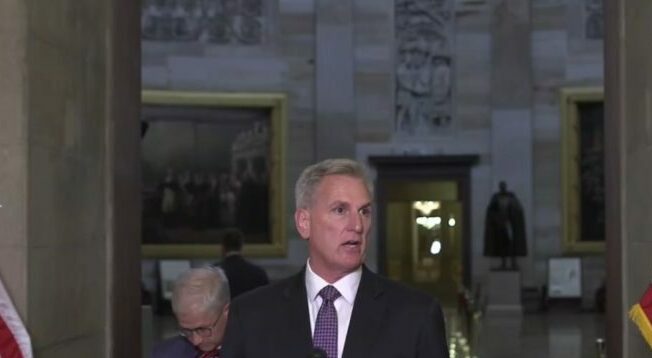The whole world is watching with angst details of the meetings and consultations taking place in the US about ten days before the US public debt reaches the ceiling set for it by law, amid a great divergence between Republicans and Democrats on the passage of the debt ceiling raising law.
Monday’s meeting between US President Joe Biden and House Speaker Kevin McCarthy failed to reach an agreement on how to raise the $31.4 trillion US government debt ceiling.
The Democratic president and the most senior Republican politician in Congress have struggled to make progress on a deal, and McCarthy has pressed the White House to approve spending cuts in the federal budget that Biden has deemed “harsh.”
After an hour-long talk with Biden in the Oval Office, McCarthy told reporters: “I feel we had a productive discussion. (But) we don’t have an agreement yet,” he said, adding that negotiators from both sides would continue consultations.
Before the meeting began, Biden expressed optimism that some progress could be made. He said both sides needed a bipartisan agreement.
Read: GCC markets mixed, US debt ceiling in focus: Report
Any deal to raise the debt ceiling must be approved by Congress and the Senate, so bipartisan support is required. Republicans control the House of Representatives and Democrats control the Senate.
The two sides have only ten days to reach an agreement and allow the United States to continue paying what it owes.
Ahead of Monday’s Biden-McCarthy meeting, US Treasury Secretary Janet Yellen warned that it was “very likely” that the US would not be able to pay all its bills by early June.
“It is highly likely that the Treasury Department will no longer be able to meet all of the government’s obligations if Congress does not take action to raise or suspend the debt limit by early June, and possibly on the first of June,” she wrote Monday afternoon.
Republicans are calling for spending cuts as a condition for any increase in the debt ceiling, and they passed a bill in April to do so, saying this was their starting point in negotiations and wanted to cap spending in the coming years.
Democrats have been refraining from negotiating for months, saying the debt ceiling should be raised without strings attached, but they began seriously engaging in talks earlier this month as the deadline approached.
Biden has said he would like to work to narrow the deficit through some tax increases for wealthy Americans, but McCarthy said tax increases were not on the table.
Republican lawmakers also want changes to permit rules that would speed up the process of building energy projects and tighten business requirements for some government benefit programs, proposals the White House has indicated some openness to.
If no deal is reached, the country will be in an unprecedented state of default with potentially catastrophic repercussions for the US and global economies from June 1.
The Treasury has warned of serious consequences if the state runs out of cash to pay its benefits, leaving it unable to pay federal employees and leading to a potential rise in interest rates with spillover effects on businesses, mortgages and global markets.
The question is: who will concede first? Does the US president consider this thorny dossier a defeat for him? Or could McCarthy approve a deal that Democrats consider acceptable, and face anger from conservative Republicans?
Some Democrats are urging Biden not to bow to Republican conditions and to invoke Article 14 of the Constitution, which states that “the validity of the public debt of the United States permitted by law … should not be in doubt.” In other words, expenditures approved by way of votes must be respected.
That means the US president will act as if the debt ceiling does not exist.
Biden is considering this legal risky prospect, especially when facing a Supreme Court that leans heavily to the right.
Some analysts argue that such a move would create significant doubts about the creditworthiness of any new debt issued by the Treasury.
Click here for more on debt ceiling.








